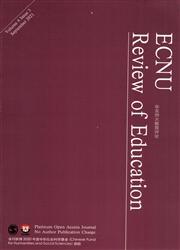“Suspending Classes Without Stopping Learning”: An Initiative to Ensure Learning During the COVID-19 Pandemic in Japan
IF 2.6
Q1 EDUCATION & EDUCATIONAL RESEARCH
引用次数: 0
Abstract
Purpose During Japan's initial COVID-19 prevention and control period, the Ministry of Education, Culture, Sports, Science and Technology of Japan (MEXT) issued several notifications to ensure students’ continuous learning according to the “Leave No One Behind” philosophy. The study focuses on the comprehensive measures of the top-level arrangements to implement the “Suspending Classes Without Stopping Learning” initiative. Design/Approach/Methods The study reviewed MEXT's guide on ensuring learning for Japanese primary and secondary school students during the pandemic. Findings The COVID-19 pandemic has accelerated the progress of the information and communications technology educational environment and the implementation of the “Global and Innovation Gateway for All (GIGA) Schools” initiative. These developments laid the foundation for the evolution of diverse pedagogical models and feasible methods for promoting equity. The home-schooling experience during the pandemic provided a natural base for students to practice and foster survivability. Originality/Value This study provides scholars with a shared understanding of the opportunities and challenges encountered in educational innovation in Japan. It provides insights into the future direction of pedagogical development, capability development, and effective educational arrangements for extraordinary circumstances to facilitate educational development from a broader perspective, particularly under the new normal.“休课不停学”:日本新冠疫情期间确保学习的举措
在日本新冠肺炎初期防控期间,日本文部科学省(MEXT)多次发布通知,确保学生按照“不让任何人掉队”的理念持续学习。重点研究了实施“停课不停学”的顶层安排的综合措施。设计/方法/方法研究审查了文部科学省关于在大流行期间确保日本中小学生学习的指南。2019冠状病毒病大流行加快了信息和通信技术教育环境的进展,加快了“面向所有学校的全球和创新门户”倡议的实施。这些发展为发展多样化的教学模式和促进公平的可行方法奠定了基础。大流行期间的家庭教育经验为学生实践和培养生存能力提供了一个自然的基础。原创性/价值本研究让学者们对日本教育创新面临的机遇和挑战有了共同的认识。它提供了对未来教学发展方向、能力发展和特殊情况下有效教育安排的见解,以更广阔的视角促进教育发展,特别是在新常态下。
本文章由计算机程序翻译,如有差异,请以英文原文为准。
求助全文
约1分钟内获得全文
求助全文
来源期刊

ECNU Review of Education
Social Sciences-Education
CiteScore
4.90
自引率
0.00%
发文量
41
审稿时长
10 weeks
 求助内容:
求助内容: 应助结果提醒方式:
应助结果提醒方式:


